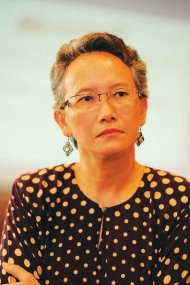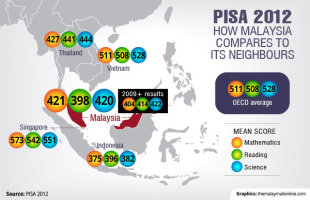KUALA LUMPUR, Dec 13 — An English-language lobby group has shot down a World Bank report that attributed the decline of Malaysian students’ science and mathematics scores to the switch in the language of instruction from Bahasa Malaysia to English.
Datin Noor Azimah Abdul Rahim, chairman of the Parent Action Group for Education (PAGE), pointed out that the 14-year-old students, who were tested in the Trends in International Mathematics and Science Study (TIMSS), were still studying the subjects in the national language when their scores were found to have dropped sharply in 2007.
“The PPSMI only started in 2003. So, in 2007, they were only in Standard Five,” Noor Azimah told The Malay Mail Online when contacted yesterday, referring to the Policy of Teaching Science and Mathematics in English (PPSMI).
She said that Malaysia’s decline in TIMSS in 2007 and further in 2011, which was noted by the World Bank’s “Malaysia Economic Monitor: High Performing Education” report, was likely caused by the poor quality of school teachers and insufficient teaching hours instead.
Noor Azimah said according to the Malaysia Education Blueprint 2013-2025, a 2011 research study on 41 schools showed that half of the lessons taught were unsatisfactory, while 38 per cent were dubbed satisfactory, and only 12 per cent were found to be of high standards.
The blueprint also revealed that based on the Education Ministry’s education management information system database, school teachers spent only between 2.4 and 2.9 hours a day teaching in the classroom, which was 40 per cent lower than countries within the Organisation for Economic Co-operation and Development (OECD) average, she said.
 “Just based on these two points, it’s evidence enough that it has nothing to do with language, but with the quality of teachers,” said Noor Azimah.
“Just based on these two points, it’s evidence enough that it has nothing to do with language, but with the quality of teachers,” said Noor Azimah.
“The quality of teachers is the most significant school-based determinant of student outcomes,” she added, quoting the blueprint.
She acknowledged that Malaysia’s drop in TIMSS in 2011 could also be due to teachers struggling to adapt to PPSMI.
“This was only the second cohort. For those teachers teaching these kids, it was a learning process. You can’t expect teachers to be excelling immediately,” she said.
She noted, however, that the questions in TIMSS were bilingual.
Noor Azimah also pointed out that according to the 2012 Programme for International Student Assessment (PISA) survey - which gave students the option of answering either in English or Bahasa Malaysia - she was informed that schools which answered in English ranked at the same level as schools in developed nations, whereas those which answered in Bahasa Malaysia scored very poorly.
 The recently released global education benchmark registered declines in Malaysian students’ reading ability and science scores, albeit with improved mathematics scores, and ranked Malaysia overall 52nd out of 65 countries, far behind Singapore that placed second in the assessment.
The recently released global education benchmark registered declines in Malaysian students’ reading ability and science scores, albeit with improved mathematics scores, and ranked Malaysia overall 52nd out of 65 countries, far behind Singapore that placed second in the assessment.
“We want the Education Ministry to reveal the school rankings in PISA,” said Noor Azimah, adding that PISA had only publicly revealed the country rankings.
PPSMI was discontinued in 2012, but the Education Ministry has made it mandatory for students sitting for the Form Five SPM examination to pass the English-language subject beginning 2016.
Lack of benchmarking, bad decisions bringing education standard down, says Wee
The failure to benchmark local education with international standards and not allowing schools and other stakeholders to make decisions that affect students are the key reasons the Malaysian education system is on the decline, said experts.
Former deputy education minister Datuk Wee Ka Siong (pic) noted that Malaysia was not up to mark in terms of education, even though Education Minister Tan Sri Muhyiddin Yassin insisted it was, simply because, "we have not benchmarked our standards with the international level of education".
"That's why we have students scoring a string of As here but when it comes to international exams, they can't make it," he told The Malaysian Insider today, referring to Malaysia's dismal performance in the Programme for International Student Assessment (Pisa).
The country only managed a poor 55th ranking out of 65 countries in the Pisa, which was done by the Organisation for Economic Co-operation and Development (OECD).
Malaysia's performance in the assessment of 15-year-olds using tests for maths, reading and science has been criticised by several opposition leaders who are calling for a major revamp of the education system.
Wee pointed out that Muhyiddin's statement showed that Malaysia was still trying to convince itself that its education standards was "not bad".
"We tell ourselves that it's not that we are not bad, it's just that other countries are really good because they have this and that.
"But this is not a valid excuse. If other countries can improve and we can't, then our standards will drop," he added.
Wee, who was deputy education minister from 2008 till early this year, said that national examinations in the country have been made too easy compared with years ago when it was tougher to pass.
Institute for Democracy and Economic Affairs (IDEAS) chief executive officer Wan Saiful Wan Jan, however, disagreed, noting that the government was already embarking on programmes to benchmark the education system here with international standards.
"We have been doing that by sitting for the Pisa assessment. The government is interested in improving the system.
"The main trouble with our education system is the desire to maintain centralisation of control," he opined.
For most countries with good education systems, Wan Saiful revealed, important decisions were made by stakeholders.
"These are people who are closer to students.
"But in Malaysia, the same decisions on policies are made by those furthest from the students, such as the minister. And it does not help that most educational policies we have are geared for political purposes," he said.
The average mean score in the Pisa test is 494 and the survey tested 510,000 students aged 15 last year, covering three examination sections, mathematics, science and reading ability. Malaysia obtained a mean score of 421.
Even Vietnam ranked 17th in the survey with 511 points while Shanghai-China scored 613 to take first place in the rankings.
Meanwhile, there has been no let-up from DAP adviser Lim Kit Siang, who continued to question Muhyiddin's silence over the Pisa rankings.
The Gelang Patah MP has been on a warpath with the Education Minister since the results of the assessment was announced recently.
"Malaysia’s declining educational standards is presently a taboo subject for the Deputy Prime Minister-cum-Education Minister who does not want to talk or be asked about it, especially after two events in December which highlighted the sad reality that the education system in Malaysia is facing a real crisis of confidence," Lim said in a statement today.
He was referring to the Pisa tests and the World Bank's report that: “Among East Asian countries that participated in the 2012 Pisa, Malaysian students only outperform their Indonesian peers, and lag even lower-income countries (including by a wide margin, Vietnam).”
Lim also criticised the ministry's answer to resolve the issue by forming yet another committee to improve Malaysia's ranking.
In response to the Pisa survey, the education ministry was reported as saying that the special committee would be led by the curriculum development section and would also comprise professional sections from the ministry.
The task of the committee is to identify and monitor initiatives to improve students' performance in international assessments such as Pisa.
In a statement, it said although the recent Pisa results were not encouraging, the authorities were confident that the Malaysian Education Development Plan 2013-2025 would help Malaysia to achieve a better ranking in the next Pisa instalment.
"Clearly, the person responsible for the ministry's statement does not know what is in the National Education Blueprint, for it is not about “getting a better position in Pisa 2015” but breaking out of the bottom-third Pisa bracket and achieving the international Pisa average in the 2015 Pisa and 2018 Pisa, and breaking into a top-third Pisa bracket in the 2021 Pisa ," Lim said.
"In other words, can Malaysia become a 'wonder nation' to achieve what no other country had ever achieved in three Pisa evaluations – a double quantum jump from bottom-third to top-third Pisa brackets?"- December 12, 2013.


No comments:
Post a Comment